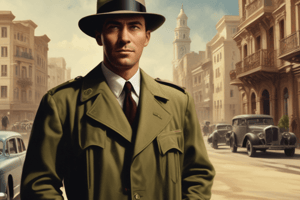Podcast
Questions and Answers
What is Casablanca known for?
What is Casablanca known for?
- A classical narrative film formula
- Having an important location
- 52 films a year
- Being a crime romance hybrid (correct)
What genre is Casablanca?
What genre is Casablanca?
Crime romance hybrid
Why was Casablanca made?
Why was Casablanca made?
To maximise profit
What was reused during the making of Casablanca?
What was reused during the making of Casablanca?
Who was the composer of Casablanca?
Who was the composer of Casablanca?
What is the featured song in Casablanca?
What is the featured song in Casablanca?
Who was the cinematographer for Casablanca?
Who was the cinematographer for Casablanca?
What does the term 'Star system' refer to?
What does the term 'Star system' refer to?
Which companies are part of the 'Big 5' in Hollywood?
Which companies are part of the 'Big 5' in Hollywood?
What does the 'Hayes Code' prohibit?
What does the 'Hayes Code' prohibit?
What is Rick's Café Americain known for?
What is Rick's Café Americain known for?
Where was Casablanca filmed?
Where was Casablanca filmed?
What does the narrator detail in the film?
What does the narrator detail in the film?
What is a key theme in Casablanca for the contemporary audience?
What is a key theme in Casablanca for the contemporary audience?
What does the Paris montage illustrate?
What does the Paris montage illustrate?
Match the following terms with their descriptions:
Match the following terms with their descriptions:
To what does Casablanca owe its success?
To what does Casablanca owe its success?
Flashcards are hidden until you start studying
Study Notes
Film Overview
- Casablanca produced 52 films a year, averaging one per week.
- The genre of Casablanca blends crime and romance, creating a hybrid format.
Production Context
- Warner Bros popularized crime/gangster films, which became a repetitive genre.
- The film aimed to maximize profits by making generic movies appealing to a broader audience.
- Reuse of sets, crew, and actors was common practice to streamline production.
Music and Composition
- Max Steiner served as the composer for Casablanca.
- "As Time Goes By" is the featured song, serving as a musical motif; it is non-diegetic at times and predates the film.
Cinematic Techniques
- Arthur Edeson was the cinematographer, showcasing specialized talents in filmmaking.
- The Hollywood "star system" promoted young actors, glamorizing their personas and often inventing identities.
Major Studios
- The Big 5 studios: RKO Radio Pictures, 20th Century Fox, Paramount Pictures, Warner Bros, Metro-Goldwyn-Mayer.
- The Little 3 studios: Universal Pictures, Columbia Pictures, United Artists.
Film Structure
- The conveyor belt system in Hollywood aimed to produce conventional films rapidly.
- Classical storytelling in Casablanca is designed to be accessible to a mass audience.
- The Hayes Code restricted depictions of nudity, long kisses, and negative portrayals of clergymen or criminals to ensure broad appeal.
Setting and Characterization
- Rick's Café Americain serves as a crucial location in the narrative.
- Most scenes were filmed on set, enhancing control over production quality.
- The opening scene establishes expository equilibrium, introducing heroes and villains through visual elements like a globe and smokey effects.
Themes and Appeal
- Major Strausser acts as the antagonist, ultimately shot at the film's conclusion.
- Contemporary audience appeal stems from relatable global crises intersecting personal romance, providing a mix of familiarity and escapism.
- Men in the film are depicted as emotionally restrained, supported by brooding lighting, while Ilsa is illuminated and expressive.
Key Dialogue and Moments
- "The World will always welcome lovers," and other poignant quotes enhance the emotional gravitas of the film.
- The Paris montage presents a manufactured backdrop, showcasing studio techniques but evoking genuine emotion through soft focus and sound effects.
Conclusion and Legacy
- The ending offers closure, with Ilsa leaving with Victor, and Rick engaging in the war effort, symbolizing a shift in US foreign policy during WWII.
- Casablanca's success is tied to its historical context and representation of American sentiments during wartime.
- The film results from a collaboration among notable Warner Bros staff, including director Michael Curtiz and cinematographer Arthur Edeson.
Studying That Suits You
Use AI to generate personalized quizzes and flashcards to suit your learning preferences.





